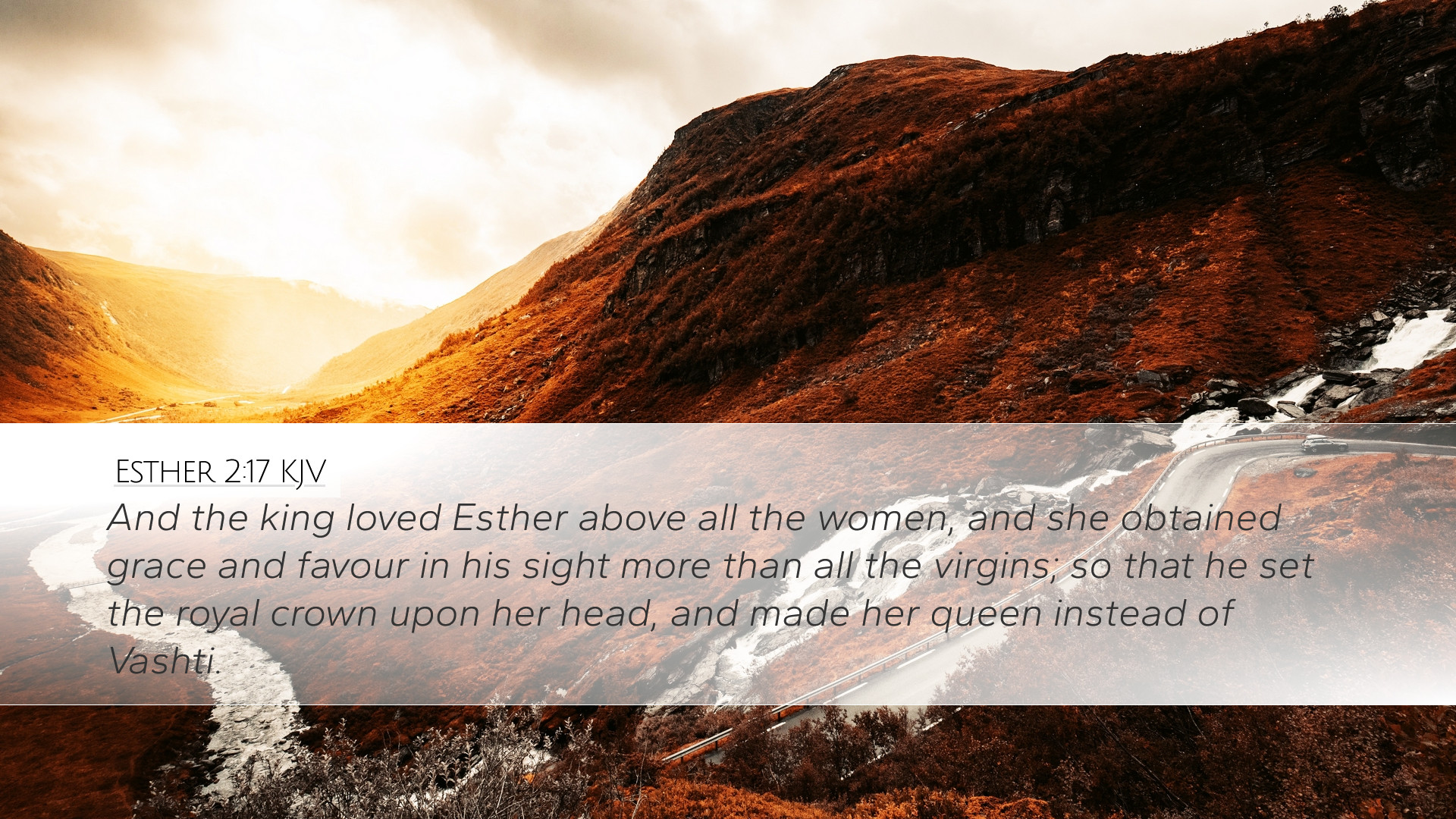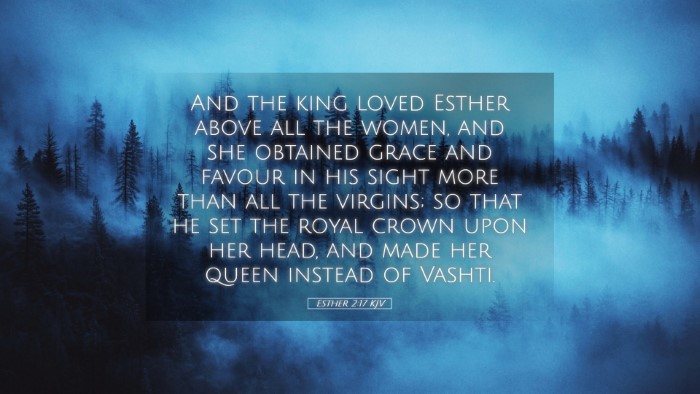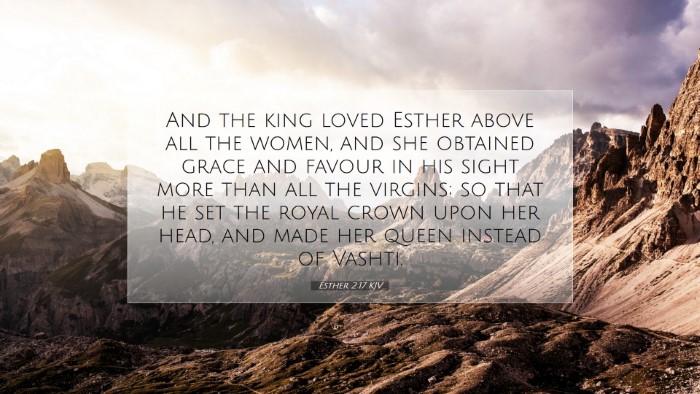Old Testament
Genesis Exodus Leviticus Numbers Deuteronomy Joshua Judges Ruth 1 Samuel 2 Samuel 1 Kings 2 Kings 1 Chronicles 2 Chronicles Ezra Nehemiah Esther Job Psalms Proverbs Ecclesiastes Song of Solomon Isaiah Jeremiah Lamentations Ezekiel Daniel Hosea Joel Amos Obadiah Jonah Micah Nahum Habakkuk Zephaniah Haggai Zechariah MalachiEsther 2:17
Esther 2:17 KJV
And the king loved Esther above all the women, and she obtained grace and favour in his sight more than all the virgins; so that he set the royal crown upon her head, and made her queen instead of Vashti.
Esther 2:17 Bible Commentary
Commentary on Esther 2:17
The passage of Esther 2:17 states, "And the king loved Esther above all the women, and she obtained grace and favour in his sight more than all the virgins; so that he set the royal crown upon her head, and made her queen instead of Vashti." This verse is pivotal in demonstrating God’s providential orchestration in the affairs of both individuals and nations, particularly through Esther's rise to royalty.
Significance of Esther's Selection
This verse highlights several profound truths that are essential for pastors, theologians, and scholars alike:
- The Role of Divine Providence: Matthew Henry notes that Esther’s favor with the king was a reflection of God's divine appointment and providence. Her selection was not merely due to her beauty or charm, but it was part of God's larger plan to save His people. This theme of divine intervention resonates throughout the book of Esther and is essential for understanding God's workings in human history.
- Grace and Favor: Albert Barnes emphasizes that Esther "obtained grace and favor," which signifies more than just external beauty. It encompasses character, poise, and perhaps an inner strength that attracted King Ahasuerus. This aligns with biblical principles that underline how God often chooses the humble and lowly to execute His purposes.
- Contrast with Vashti: The selection of Esther over Vashti is significant. Adam Clarke delineates that Vashti’s refusal to be paraded before the king reflected a defiance against the king’s authority. In contrast, Esther's willingness to accept her role signifies humility and obedience, positioning her as a successor chosen by divine design.
Character of Esther
Esther’s character emerges as a key theme in this verse. The text shows not just her beauty but also her ability to win favor:
- Humility: Esther's humility is profoundly significant. She did not seek the crown but was placed in a situation where she could fulfill God’s plan, as highlighted by Henry.
- Wisdom and Discretion: Esther's ability to navigate her environment wisely is a reflection of her discretion. Clarke notes that her character won her the king's heart, implying that inner virtue attracts kindness and favor.
- Identity and Purpose: Her name, Esther, signifies "star," and as a star shines in darkness, so does Esther in the midst of impending doom for her people. Barnes points out that understanding her identity as a Jewish woman will become crucial in her later actions, suggesting that God's purpose for her was not only to become queen but also to be a savior for her people.
Theological Implications
This verse opens up profound theological discussions:
- God's Sovereignty: The selection of Esther as queen illustrates the sovereignty of God in guiding events according to His will. The events leading to her becoming queen seem coincidental but point towards a divine plan—God’s silent hand orchestrating history for the sake of His covenant people.
- The Value of Inner Beauty: The contrast between Esther and Vashti illuminates the biblical principle that true beauty is not outward but stemmed from integrity and character. A woman of grace—and indeed all believers—should look to cultivate godly traits that reflect Christ, as noted by both Henry and Barnes.
- Preparation for Action: Esther's ascension serves as preparation for the crucial role she will play in the coming chapters of saving her people. The timing of her rise speaks to the significance of being prepared for the divine purpose God has for each believer. As Clarke points out, God's positioning is often a preparation for future responsibilities or missions.
Practical Applications
For pastors and theologians, Esther 2:17 also provides several practical applications:
- Encouragement to Trust in Divine Timing: Just as God prepared Esther for her moment, pastors can encourage congregations to trust in God’s timing for their own lives and ministry, reminding them that God is always at work for those who love Him.
- Modeling Christian Character: Emphasizing the importance of cultivating inner beauty and godly character, church leaders can stress that personal integrity and wisdom are integral to our witness in the world.
- Embracing Unlikely Roles: Esther's position encourages believers to accept roles and responsibilities that may seem extraordinary or beyond their natural inclination. It speaks to the idea that God equips those He calls, often in significant capacities.
Conclusion
In summary, Esther 2:17 serves as a critical key to unlocking the overarching narrative of the book of Esther. Insight garnered from public domain commentaries reveals the intricacies of God’s providence, Esther's character, and profound theological implications. These reflections encourage deep contemplation of God's sovereignty and the role of faithfulness in the lives of believers. As scholars and leaders engage with this text, awareness of these themes will elevate their understanding and application of Scripture in both personal and communal contexts.


